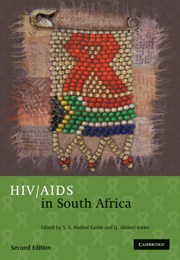Book contents
- Frontmatter
- Contents
- List of Contributors
- Foreword: Peter Piot
- Foreword: Nelson R Mandela
- Acknowledgements
- Section 1 Birth of a rapidly growing epidemic
- Section 2 The virus, the human host and their interactions
- Section 3 HIV risk factors and prevention strategiess
- 9 Reducing sexual risk behaviours: theory and research, successes and challenges
- 10 Barrier methods
- 11 Mother-to-child transmission (MTCT) of HIV-1
- 12 Sexually transmitted infections
- 13 Safe blood supplies
- 14 Intravenous drug use in South Africa
- 15 Positive prevention interventions
- 16 New prevention strategies under development and investigation
- Section 4 Focal groups for understanding the HIV epidemic
- Section 5 The impact of AIDS
- Section 6 Treating HIV
- Section 7 What does the future hold?
- Index
12 - Sexually transmitted infections
Published online by Cambridge University Press: 07 September 2011
- Frontmatter
- Contents
- List of Contributors
- Foreword: Peter Piot
- Foreword: Nelson R Mandela
- Acknowledgements
- Section 1 Birth of a rapidly growing epidemic
- Section 2 The virus, the human host and their interactions
- Section 3 HIV risk factors and prevention strategiess
- 9 Reducing sexual risk behaviours: theory and research, successes and challenges
- 10 Barrier methods
- 11 Mother-to-child transmission (MTCT) of HIV-1
- 12 Sexually transmitted infections
- 13 Safe blood supplies
- 14 Intravenous drug use in South Africa
- 15 Positive prevention interventions
- 16 New prevention strategies under development and investigation
- Section 4 Focal groups for understanding the HIV epidemic
- Section 5 The impact of AIDS
- Section 6 Treating HIV
- Section 7 What does the future hold?
- Index
Summary
SOUTH AFRICA HAS SOME of the highest sexually transmitted infection (STI) prevalence levels in the world. Classical STIs contribute to infertility and pregnancy and birth complications in women. However, the most important consequence of the classical STIs, from a public health perspective, is the enhanced transmission of HIV in the presence of these STIs. This enhancement of HIV transmission is a result of classical STIs causing inflammation of the genital tract, which increases the presence of T lymphocytes and macrophages. Ulcerative STIs also disrupt the genital epithelial barrier. Both increase susceptibility to HIV infection in the HIV-negative partner. An HIV-infected partner also sheds more virus in the presence of a classical STI, so increasing the probability of HIV transmission.
Results of studies on the effect of treating classical stis on hiv incidence are conflicting. Programmes to prevent hiv transmission by managing individuals presenting with stis appropriately are most likely to be effective early in an hiv epidemic, but even when introduced in relatively advanced hiv/aids epidemics, such programmes are likely to be cost-effective. The principle of treating stis syndromically has been established and implemented in public sector health services in South Africa.
Introduction
The classical stis are infections caused by bacteria, fungi, protozoa and viruses other than hiv, which are transmitted by sexual contact, causing a variety of clinical conditions. South Africa ranks as one of the countries with the highest prevalence of classical stis in the world.
- Type
- Chapter
- Information
- HIV/AIDS in South Africa , pp. 216 - 225Publisher: Cambridge University PressPrint publication year: 2010



